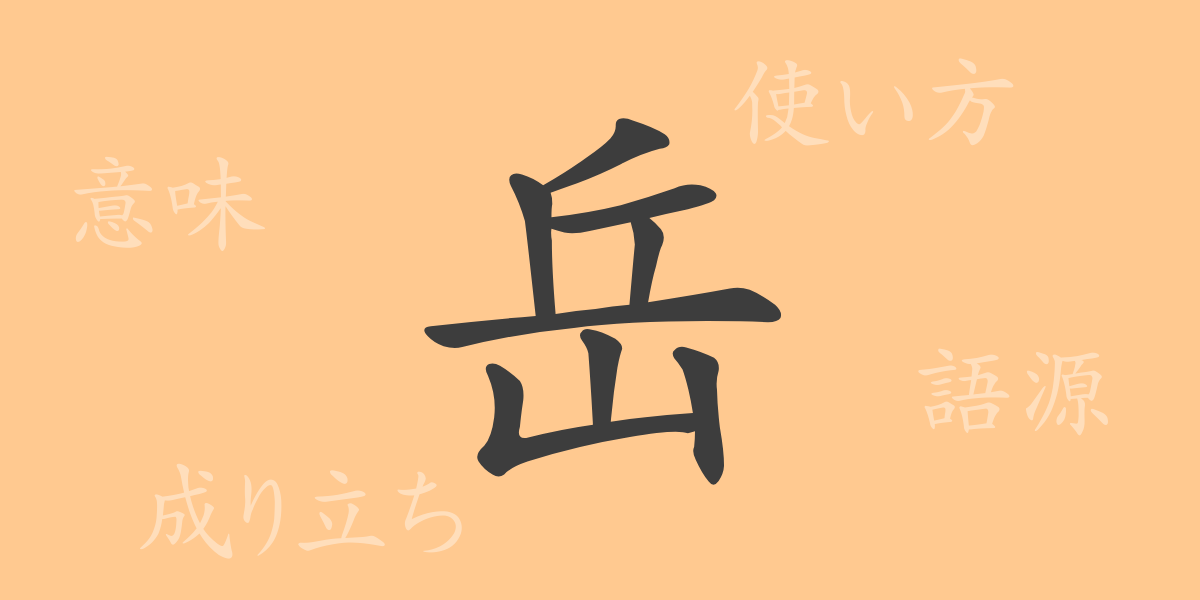Japan’s natural beauty continues to enchant people around the world through its seasonal landscapes. Among these, the majestic “mountains” (岳 (Gaku)) have long been an object of admiration for many climbers and nature enthusiasts. But what history and meaning are imbued in the kanji “mountain” (岳 (Gaku))? This article delves deep into the charm of the commonly used kanji “mountain” (岳 (Gaku)), exploring its origins, meaning, usage, and even its presence in idioms and phrases.
The Origin (Etymology) of the Kanji “Mountain” (岳 (Gaku))
The kanji “mountain” (岳 (Gaku)) originated in ancient China and was formed by combining the character for mountain (山 (San)) with an additional element that represents height and steepness (丘 (Kyuu)). This combination signifies that “mountain” (岳 (Gaku)) refers to a mountain that is more than just any mountain – it is a solemn and tall one.
The Meaning and Usage of “Mountain” (岳 (Gaku))
“Mountain” (岳 (Gaku)) is used to refer to particularly tall mountains or those that stand out within a mountain range. For example, “Fuji Mountain” (富士岳 (Fujigaku)) is an honorific name for Mount Fuji, used to express a mountain that holds a special place in the hearts of the Japanese people.
How to Read “Mountain” (岳 (Gaku)), Stroke Count, and Radical
The kanji “mountain” (岳 (Gaku)) conveys the grandeur and power of mountains through its shape.
- Reading: On’yomi (Sino-Japanese reading) is “Gaku”, Kun’yomi (native Japanese reading) is “take”
- Stroke Count: A total of 8 strokes
- Radical: Mountain radical (山部 (Yamahenn))
Idioms, Phrases, and Proverbs Using “Mountain” (岳 (Gaku)) and Their Meanings
Idioms, phrases, and proverbs that include “mountain” (岳 (Gaku)) often carry meanings related to the strength and height of mountains.
- “Separate Mountain” (別岳 (Betugaku)) – To differ as if being separate mountains
- “Yueyang” (岳陽 (Gakuyou)) – The name of a famous mountain in China, associated with beautiful scenery
- “Mount Tai” (泰岳 (Taigaku)) – Refers to Mount Tai, used to describe something or someone that is exceptionally outstanding
Summary on “Mountain” (岳 (Gaku))
The commonly used kanji “mountain” (岳 (Gaku)) is a character that embodies a presence that goes beyond just any mountain. This single character, representing towering mountains, is imbued with the grandeur of nature and the reverence people hold for it. By understanding its reading, stroke count, and radical, one can gain a deeper appreciation for the Japanese language and its context. Furthermore, knowing idioms and phrases that include “mountain” (岳 (Gaku)) allows one to appreciate the richness of language and its cultural significance. The kanji “mountain” (岳 (Gaku)), with its dignified presence reminiscent of a mountain’s stature, occupies a special place in the Japanese lexicon.

























